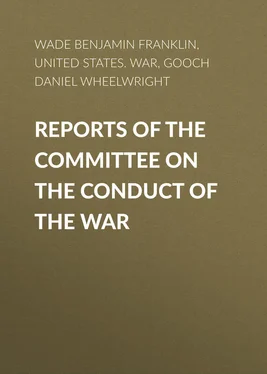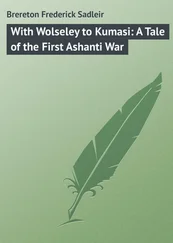Benjamin Wade - Reports of the Committee on the Conduct of the War
Здесь есть возможность читать онлайн «Benjamin Wade - Reports of the Committee on the Conduct of the War» — ознакомительный отрывок электронной книги совершенно бесплатно, а после прочтения отрывка купить полную версию. В некоторых случаях можно слушать аудио, скачать через торрент в формате fb2 и присутствует краткое содержание. Жанр: История, foreign_antique, foreign_prose, на английском языке. Описание произведения, (предисловие) а так же отзывы посетителей доступны на портале библиотеки ЛибКат.
- Название:Reports of the Committee on the Conduct of the War
- Автор:
- Жанр:
- Год:неизвестен
- ISBN:нет данных
- Рейтинг книги:3 / 5. Голосов: 1
-
Избранное:Добавить в избранное
- Отзывы:
-
Ваша оценка:
- 60
- 1
- 2
- 3
- 4
- 5
Reports of the Committee on the Conduct of the War: краткое содержание, описание и аннотация
Предлагаем к чтению аннотацию, описание, краткое содержание или предисловие (зависит от того, что написал сам автор книги «Reports of the Committee on the Conduct of the War»). Если вы не нашли необходимую информацию о книге — напишите в комментариях, мы постараемся отыскать её.
Reports of the Committee on the Conduct of the War — читать онлайн ознакомительный отрывок
Ниже представлен текст книги, разбитый по страницам. Система сохранения места последней прочитанной страницы, позволяет с удобством читать онлайн бесплатно книгу «Reports of the Committee on the Conduct of the War», без необходимости каждый раз заново искать на чём Вы остановились. Поставьте закладку, и сможете в любой момент перейти на страницу, на которой закончили чтение.
Интервал:
Закладка:
Question. Have you been a slave?
Answer. Yes, sir.
Question. Where did you enlist?
Answer. In Tennessee.
Question. Were you in the fight at Fort Pillow?
Answer. Yes, sir.
Question. What did you see done there after the fight was over?
Answer. I saw nothing, only the boys run down the hill, and they came down and shot them.
Question. Were you wounded before or after you surrendered?
Answer. After the surrender, about 5 o'clock.
Question. Did you have your gun in your hands when you were wounded?
Answer. No, sir; I threw my gun into the river.
Question. How did they come to shoot you?
Answer. I was in the water, and a man came down and shot me with a revolver.
Question. Did you see anybody else shot?
Answer. Yes, sir; right smart of them, in an old coal boat. I saw one man start up the bank after he was shot in the arm, and then a fellow knocked him back into the river with his carbine, and then shot him. I did not go up the hill after I was shot. I laid in the water like I was dead until night, and then I made up a fire and dried myself, and staid there till the gunboat came along.
Question. Did they shoot you more than once?
Answer. No, sir.
Henry Christian, (colored,) private, company B, 6th United States heavy artillery, sworn and examined.
By Mr. Gooch:
Question. Where were you raised?
Answer. In East Tennessee.
Question. Have you been a slave?
Answer. Yes, sir.
Question. Where did you enlist?
Answer. At Corinth, Mississippi.
Question. Were you in the fight at Fort Pillow?
Answer. Yes, sir.
Question. When were you wounded?
Answer. A little before we surrendered.
Question. What happened to you afterwards?
Answer. Nothing; I got but one shot, and dug right out over the hill to the river, and never was bothered any more.
Question. Did you see any men shot after the place was taken?
Answer. Yes, sir.
Question. Where?
Answer. Down to the river.
Question. How many?
Answer. A good many; I don't know how many.
Question. By whom were they shot?
Answer. By secesh soldiers; secesh officers shot some up on the hill.
Question. Did you see those on the hill shot by the officers?
Answer. I saw two of them shot.
Question. What officers were they?
Answer. I don't know whether he was a lieutenant or captain.
Question. Did the men who were shot after they had surrendered have arms in their hands?
Answer. No, sir; they threw down their arms.
Question. Did you see any shot the next morning?
Answer. I saw two shot; one was shot by an officer – he was standing, holding the officer's horse, and when the officer came and got his horse he shot him dead. The officer was setting fire to the houses.
Question. Do you say the man was holding the officer's horse, and when the officer came and took his horse he shot the man down?
Answer. Yes, sir; I saw that with my own eyes; and then I made away into the river, right off.
Question. Did you see any buried?
Answer. Yes, sir; a great many, black and white.
Question. Did you see any buried alive?
Answer. I did not see any buried alive.
Aaron Fentis, (colored,) company D, 6th United States heavy artillery, sworn and examined.
By the chairman:
Question. Where were you from?
Answer. Tennessee.
Question. Have you been a slave?
Answer. Yes, sir.
Question. Where did you enlist?
Answer. At Corinth.
Question. Who was your captain?
Answer. Captain Carron.
Question. Were you in the fight at Fort Pillow?
Answer. Yes, sir.
Question. What did you see done there?
Answer. I saw them shoot two white men, and two black men, after they had surrendered.
Question. Are you sure they were shot after they had surrendered?
Answer. Yes, sir. Some were in the river swimming out a piece, when they were shot; and they took another man by the arm, and held him up, and shot him in the breast.
Question. Did you see any others shot?
Answer. Yes, sir; I saw two wounded men shot the next morning; they were lying down when the secesh shot them.
Question. Did the rebels say anything when they were shooting our men?
Answer. They said they were going to kill them all; and they would have shot us all if the gunboat had not come along.
Question. Were you shot?
Answer. Yes, sir.
Question. When?
Answer. After the battle, the same evening.
Question. Where were you shot?
Answer. Right through both legs.
Question. How many times were you shot?
Answer. Only once, with a carbine. The man stood right close by me.
Question. Where were you?
Answer. On the river bank.
Question. Had you arms in your hands?
Answer. No, sir.
Question. What did the man say who shot you?
Answer. He said they were going to kill us all.
Question. Did you see any men buried?
Answer. No, sir.
Question. Did you see anybody burned?
Answer. No, sir; I did not see that. Where I was was a good piece off from where they had the battle.
Question. Do you know how many of your company got away?
Answer. I do not think any of my company got away.
Question. How many were killed before they surrendered?
Answer. I don't know how many; a good many, I think.
Question. Would you have surrendered, if you had known what they were going to do to you?
Answer. No, sir.
George Shaw, (colored,) private, company B, 6th United States heavy artillery, sworn and examined.
By Mr. Gooch:
Question. Where were you raised?
Answer. In Tennessee.
Question. Where did you enlist?
Answer. At Fort Pillow.
Question. Were you there at the fight?
Answer. Yes, sir.
Question. When were you shot?
Answer. About four o'clock in the evening.
Question. After you had surrendered?
Answer. Yes, sir.
Question. Where were you at the time?
Answer. About ten feet from the river bank.
Question. Who shot you?
Answer. A rebel soldier.
Question. How near did he come to you?
Answer. About ten feet.
Question. What did he say to you?
Answer. He said, "Damn you, what are you doing here?" I said, "Please don't shoot me." He said, "Damn you, you are fighting against your master." He raised his gun and fired, and the bullet went into my mouth and out the back part of my head. They threw me into the river, and I swam around and hung on there in the water until night.
Question. Did you see anybody else shot?
Answer. Yes, sir; three young boys, lying in the water, with their heads out; they could not swim. They begged them as long as they could, but they shot them right in the forehead.
Question. How near to them were they?
Answer. As close as that stone, (about eight or ten feet.)
Question. How old were the boys?
Answer. Not more than fifteen or sixteen years old. They were not soldiers, but contraband boys, helping us on the breastworks.
Question. Did you see any white men shot?
Answer. No, sir. I saw them shoot three men the next day.
Question. How far from the fort?
Answer. About a mile and a half; after they had taken them back as prisoners.
Question. Who shot them?
Answer. Private soldiers. One officer said, "Boys, I will have you arrested, if you don't quit killing them boys." Another officer said, "Damn it, let them go on; it isn't our law to take any niggers prisoners; kill every one of them." Then a white man took me to wait on him a little, and sent me back to a house about two hundred yards, and told me to stay all night. I went back and staid until about a half an hour by sun. Another man came along and said, "If you will go home with me I will take good care of you, if you will stay and never leave." I did not know what to do, I was so outdone; so I said, "If you will take care of me, I will go." He carried me out about three miles, to a place called Bob Greene's. The one who took me there left me, and two others came up, and said, "Damn you, we will kill you, and not be fooling about any longer." I said, "Don't shoot me." One of them said, "Go out and hold my horse." I made a step or two, and he said, "Turn around; I will hold my horse, and shoot you, too." I no sooner turned around than he shot me in the face. I fell down as if I was dead. He shot me again, and hit my arm, not my head. I laid there until I could hear him no more, and then I started back. I got back into Fort Pillow about sun up, and wandered about there until a gunboat came along, and I came up on that with about ten others.
Читать дальшеИнтервал:
Закладка:
Похожие книги на «Reports of the Committee on the Conduct of the War»
Представляем Вашему вниманию похожие книги на «Reports of the Committee on the Conduct of the War» списком для выбора. Мы отобрали схожую по названию и смыслу литературу в надежде предоставить читателям больше вариантов отыскать новые, интересные, ещё непрочитанные произведения.
Обсуждение, отзывы о книге «Reports of the Committee on the Conduct of the War» и просто собственные мнения читателей. Оставьте ваши комментарии, напишите, что Вы думаете о произведении, его смысле или главных героях. Укажите что конкретно понравилось, а что нет, и почему Вы так считаете.












